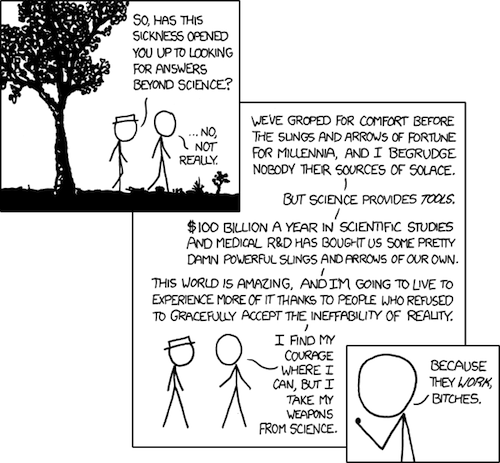We start off with a defense against narrow rules: in Matthew 15:2, the scribes and Pharisees ask “Why do thy disciples transgress the tradition of the elders? for they wash not their hands when they eat bread.” And Jesus’s answer is Matthew 15:11, “Not that which goeth into the mouth defileth a man; but that which cometh out of the mouth, this defileth a man.” (Along with an accusation of hypocrisy in Matthew 15:3-9, for good measure.) Which is nice to hear: in Matthew 5:19, we were told that we shouldn’t “break one of these least commandments”, so I’m glad that Jesus has mellowed a bit. Though, having said that, I can’t say I understand exactly what I’m allowed to do and what I’m not allowed.
Then, in Matthew 15:22, we have the appearance of the “woman of Canaan”. I find this whole bit rather interesting: his first answer to her request for healing, from Matthew 15:24, is that “I am not sent but unto the lost sheep of the house of Israel”. Part of me really doesn’t like this at all: here’s somebody in need, and you turn her away because she’s not from your tribe? I am assuming, however, that Jesus can’t actually heal everybody in the world, or even everybody who comes to him, so some rationing of care is necessary; in that context, I can understand prioritizing those in need who are close to you.
I guess, to me, the upshot is: let’s find a way to fix that constraint. And others like it: in Matthew 15:32-38, we have a repeat of the loaves and the fishes. Here too I assume he’s operating under a similar constraint, in that seven loaves and a few fishes will feed four thousand people, but not the world. So let’s find a way to feed everybody instead.
And, indeed, Christian churches do try to feed those in need, and Christian hospitals try to cure those who ail. But they’re not going it alone: without the advances that science has brought, or indeed the flourishing of the overall economy that free markets have brought, there would be a lot less food and healing to go around. Still, they are trying, which puts them quite a bit ahead of smug bloggers pontificating from the comforts of their own home…
I was going to end there, but while doing the final proofreading, I took a break and browsed my RSS feeds, and ran into today’s (as I’m writing this) xkcd:
Which, if I ended there, could be interpreted a needlessly antagonistic spin. So, let me repeat: it’s awesome that Jesus cured the sick and healed the hungry. He was doing the best he could with the tools he had, and his best was far better than anything I’m managing today. But let us take from that the lesson that we should be compassionate to those in need, and use whatever tools we can find to that end, including (especially including!) tools that minimize the need for that compassion by reducing the number of those in need in the first place!
Post Revisions:
This post has not been revised since publication.


 Posts
Posts
I was just tidying up my RSS reader, moving through your latest round of posts, and mulling them over before I began a pre-snooze round of physical, ink-on-paper reading. I’m beginning Matt Ridley’s The Rational Optimist over the holiday, which tracks a few of the passages you’d cited. This one stood out as particularly pithy and appropriate:
“It is precisely because so much human betterment has been shown to be possible in recent centuries that the continuing imperfection of the world places a moral duty on humanity to allow economic evolution to continue. To prevent change, innovation and growth is to stand in the way of potential compassion.”
12/30/2010 @ 9:59 pm
Ooh, good quote. Yeah, that book has definitely been in my mind while I’ve been writing this series of posts.
1/2/2011 @ 4:47 pm